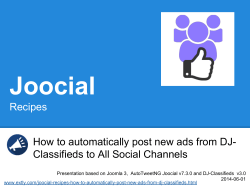
Content Management Systems Week 14 LBSC 671 Creating Information Infrastructures
Content Management Systems Week 14 LBSC 671 Creating Information Infrastructures Putting the Pieces Together Web Server Browser Database HTML CGI HTML SQL Query Results Why Database-Generated Pages? • Remote access to a database – Client does not need the database software • Serve rapidly changing information – e.g., Airline reservation systems • Provide multiple “access points” – By subject, by date, by author, … • Record user responses in the database Why Content Management Systems? • Separation of content and appearance • Separation of roles • Standardization of common “design patterns” – – – – – Login and password recovery Headlines and drill-down Site map Search Shopping cart Content Management Systems • WordPress – http://wordpress.org • Joomla – http://www.joomla.org • Drupal – https://drupal.org Roles • • • • • • • Information architecture design Task assignment Content generation and modification Approval for “publication” Publication Error correction Tracking task progress Content Management System Structure • Database stores the content – And access control data and parameters • Server scripting controls the user experience – PHP readss database, generates HTML • (X)HTML conveys the user experience • User-side scripting enhances interactivity – JavaScript may be used for form validation Business Interaction Design rules Interface Design Client Hardware Web Browser Client-side Programming Interchange Language Server-side Programming (PC) (IE, Firefox) (JavaScript) (HTML, XML) (PHP) Database (MySQL) Server Hardware (PC, Unix) “Site Blueprint” Main Homepage Teaching Research Other Activities LBSC 690 Ph.D. Students IR Colloquium INFM 718R Publications TREC Doctoral Seminar Projects Grid Layouts Navigation Bar Navigation Bar Content Content Navigation Bar Content Related Links Navigation Bar Content Grid Layout: NY Times Grid Layout: NY Times Navigation Banner Ad Another Ad Content Popular Articles Grid Layout: ebay Grid Layout: ebay Navigation Banner Ad Navigation Related Search Results Grid Layout: Amazon Grid Layout: Amazon Navigation Navigation Related Search Results Some Layout Guidelines • Contrast: make different things different – to bring out dominant elements – to create dynamism • Repetition: reuse design throughout the interface – to achieve consistency • Alignment: visually connect elements – to create flow • Proximity: make effective use of spacing – to group related and separate unrelated elements Joomla Structure • Front end – The Web site • Back end – Where the Web site is defined Joomla Components • Web sites are made up of rectangular pieces – Called “modules” • Two basic types of modules: – Displaying content (e.g., articles) – Interaction (e.g., login) • Templates define where modules can be put – Templates define abstract “positions” – Joomla maps positions to layout in ways appropriate to the device Joomla Features • Menus control navigation – Menu items control where you can go • Categories group things (i.e., entities) – University courses, Apollo missions, Meetups, … • Extensions allow you to add new capabilities – JCE Editor, Image rotator, Google maps, … Joomla Hosting • Your own computer – Useful as a way to try things out – Not easily accessable to others • Demo account (for 30 days) at joomla.org – You can pay to keep it past 30 days • Web hosting service – Longer life, more support, or less cost – More complex to set up Joomla First Steps • System->Control Panel – Gets to the back-end home • Install the Joomla Content Editor (JCE) • Learn how to insert content – Images, text without formatting • Learn how to set up menu items • Learn how to control layout Ajax Applications • Google Maps – http://maps.google.com • Google Suggest – http://www.google.com/webhp?complete=1&hl=en • Sajax Tables – http://labs.revision10.com/?p=5 • Sajax – http://www.modernmethod.com/sajax/ Navigation Patterns • Drive to content • Drive to advertisement • Move up a level • Move to next in sequence • Jump to related Before You Go On a sheet of paper, answer the following (ungraded) question (no names, please): What was the muddiest point in this semester?
© Copyright 2025

















